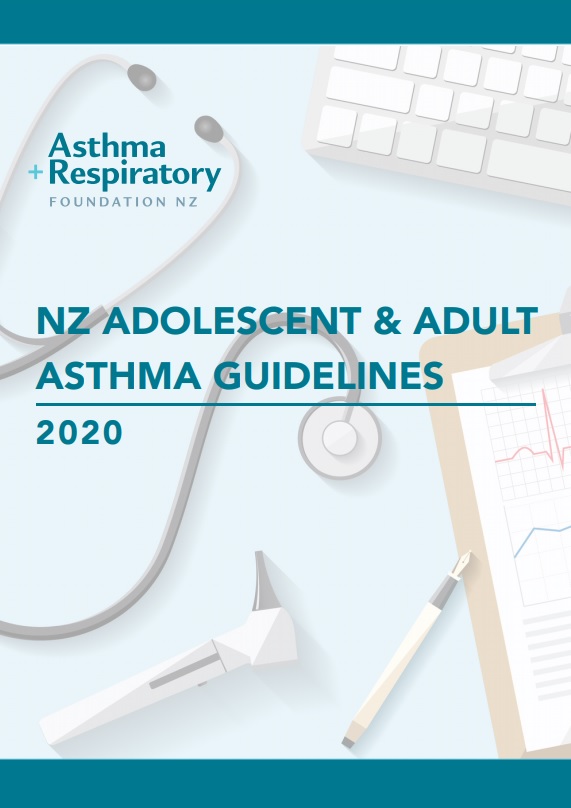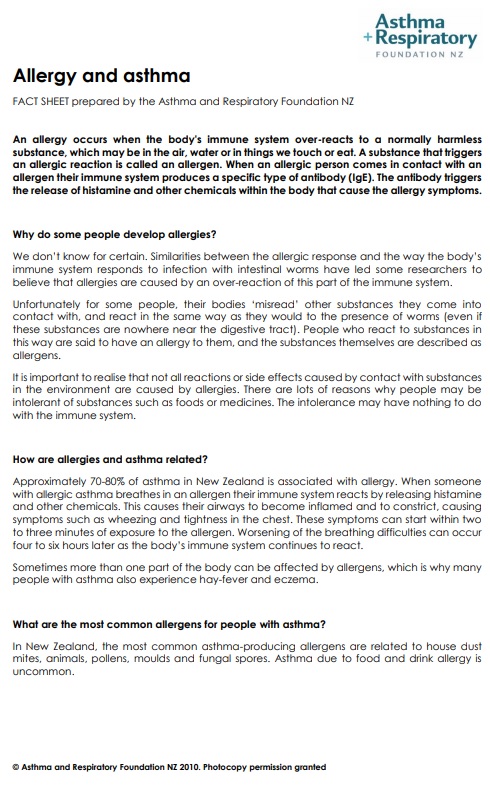Asthma and pregnancy
Key points about asthma and pregnancy
- Changes to your body during pregnancy may affect your asthma – it may become better or it may get worse.
- Asthma may reappear during pregnancy, even if you haven't had it since childhood.
- Don't stop your asthma medication unless advised by your healthcare provider.
- Know the asthma warning signs to watch for and avoid situations that trigger asthma attacks.
- Get the flu, whooping cough and COVID-19 vaccinations to protect yourself and your unborn child.
- Create an asthma management action plan with your healthcare provider.

Every woman reacts to pregnancy differently. During pregnancy, asthma control improves for about a third of women, gets worse for a third and stays the same for about a third.
Asthma symptoms can get worse at any stage of pregnancy, but it's most likely to happen between 17 and 36 weeks – mainly in the 6th month of pregnancy.
Asthma can also begin again during pregnancy even if you haven’t experienced asthma symptoms since you were a child.
If your asthma is well controlled during pregnancy, you’ll generally have a normal pregnancy with little or no increased risk of harm to you or your developing baby.
If your asthma isn’t controlled during pregnancy, it can cause possible harm to you and your baby. If you're having trouble breathing, your baby might not get enough oxygen.
Risks to your health
- High blood pressure and pre-eclampsia – a condition associated with high blood pressure that can affect the placenta, kidneys, liver and brain.
- Vaginal bleeding.
- Complicated labour.
Risks to your baby's health
- Slow growth of your pēpi and low birth weight (the baby is small when born).
- Preterm birth (early birth before 37th week of pregnancy).
- Death of the baby immediately before or after birth.
Signs that your asthma may be getting worse include:
- a cough that is worse at night, early morning, or when you exercise
- wheezing
- breathlessness
- tightness in your chest
- using more of your reliever inhaler than usual (if you’re needing to use your reliever inhaler 3 or more times per week you may be at risk of an asthma attack).
If you have these symptoms, talk to your healthcare provider or asthma specialist, who will advise you on the best treatment.
Signs of a severe asthma attack include:
- severe difficulty with breathing, walking or talking
- your lips or skin turning blue
- exhaustion and tiredness due to the effort of breathing
- wheezing stopping suddenly.
If you experience any of these signs of a severe asthma attack, dial 111 and ask for an ambulance.
Any medicine you take during pregnancy can affect your baby, but inhaled asthma medicines won’t harm your baby. Your baby will do best if you are breathing well, so it’s important that your asthma is well-controlled.
Medical experts advise that it’s far safer to manage your asthma with medicine than it is to leave asthma untreated or poorly controlled during pregnancy. So, it’s important to keep taking your medicine as normal unless your healthcare provider tells you to stop.
Asthma treatment during pregnancy is the same for non-pregnant people. Read more about medicines used to manage asthma.

Image credit: Depositphotos
Preventer inhalers
- Preventer inhalers help to control your asthma.
- Preventer inhalers contain a corticosteroid which doesn’t relieve your symptoms immediately but builds up over time (weeks to months) to reduce swelling in the airways and stop your asthma symptoms developing.
- Use your prescribed regular preventer inhaler throughout pregnancy, even when you are well, to reduce the chance of severe asthma attacks.
- Examples of preventer inhalers are:
Reliever inhalers
- Reliever inhalers work quickly to reduce your symptoms straight away.
- They work by relaxing the muscles around your airways, allowing them to widen and making it easier for you to breathe.
- You should use your reliever inhaler whenever you get asthma symptoms or if you’re having an asthma attack.
- Everyone with asthma should have a reliever inhaler and you should always carry your reliever inhaler with you.
- Examples of reliever inhalers are:
- Salamol®
- Salbutamol (SalAir®, Ventolin®)
- Bricanyl®.
Combination inhalers
- Combination inhalers contain both preventer and long-acting reliever medications – they relieve asthma symptoms and also help to prevent the underlying inflammation.
- Some combination inhalers need to be used with a reliever, others can be used as both a preventer and/or reliever by themselves.
- As for the other inhalers, continue to use your combination inhaler as advised by your healthcare provider during pregnancy.
- Examples of combination inhalers are:
The use of reliever inhalers without a preventer inhaler is no longer recommended. Read more about using combination inhalers to manage asthma. Your healthcare provider will suggest the most appropriate inhalers for you.
Steroid tablets
- Steroid tablets contain more anti-inflammatory corticosteroid than a preventer inhaler.
- They are prescribed by your doctor or nurse prescriber for a short time if your asthma gets worse.
- Steroid tablets work to reduce the inflammation(swelling) in your airways and are safe to take as a short course during pregnancy.
- An example of a steroid tablet is prednisone. Read more about steroid tablets.
Make sure that asthma is included in your birth plan so that everyone supporting you knows you have asthma and what to do if you have symptoms.
If you’re taking asthma medicine, continue doing so during labour and delivery. Most women don’t get severe asthma symptoms during labour and delivery. During labour and delivery you have the same choice of pain medication as any woman.
You may be advised to have continuous monitoring of your baby during labour and delivery.
It’s safe to continue your asthma medicines while you’re breastfeeding. Inhaled asthma medicines are not found in breast milk. Breastfeeding has lots of benefits for you and your baby and it may reduce the chances of your child developing asthma.
There are many things you can do to help reduce the severity of your asthma symptoms and how often you get them.
Have an asthma management action plan
Everyone with asthma should have an asthma management action plan(external link). This is a written plan that you develop with your healthcare provider to help control your asthma.
Your action plan describes the medicines you need to take and when to take them. It also explains how to adjust your treatment to meet your needs, such as if your asthma is getting worse, or during asthma attacks.
Also, make sure that asthma is included in your birth plan so that everyone supporting you during your pregnancy and labour knows you have asthma and what to do if you have symptoms.
Exercise regularly
You can continue to exercise normally during your pregnancy. If you find that exercise makes your asthma worse, try using your reliever or combination inhaler before exercise.
Talk to your healthcare provider about how you should manage your symptoms.
Avoid smoking
Don't smoke or vape during your pregnancy and avoid second hand smoke. This can make your asthma worse.
Smoking during pregnancy increases the chance of sudden unexplained death of an infant (SUDI) and of chest infections, asthma and middle-ear disease in babies.
Read more about smoking and pregnancy, and how to quit.
Avoid allergic triggers
As much as possible try to avoid or control the things that make your asthma worse (called triggers), such as animal fur, pollen, mould and dust.
Control conditions affecting your nose
Conditions such as sinusitis or hay fever can make asthma worse. The common symptoms are sneezing, a blocked or runny nose, an itchy nose, mouth or inner ear, and headaches.
Talk to your healthcare provider about how to best manage these symptoms if they bother you.
Control gastro-oesophageal reflux disease (GORD) symptoms
GORD causes acid reflux and heartburn, which can make asthma symptoms worse. If you develop GORD, talk to your healthcare provider about how to best manage your symptoms.
Some suggestions to help reduce GORD symptoms include to:
- raise the head of your bed with extra pillows
- eat smaller meals
- wait at least 3 hours after eating before lying down
- avoid foods that seem to cause heartburn.
Get the flu, pertussis and COVID-19 vaccine
Having the flu (influenza) can make your asthma worse. The flu vaccine gives you extra protection against the flu. It's safe to be vaccinated while hāpu and is recommended for all pregnant people. Get the flu vaccine as soon as it is available, whether you're in your first, second or third trimester at the time.
If you catch COVID-19 when you’re pregnant, you’re more likely to become very unwell, so it’s a good idea to get vaccinated or get your booster when you become eligible. You can get a COVID-19 vaccine at any stage of your pregnancy.
Pertussis vaccine protects against the bacterial infection whooping cough (also called pertussis) that causes uncontrollable coughing. Complications can be serious, including pneumonia and seizures. You should have the pertussis vaccine preferably within the second trimester of pregnancy, from 16 weeks, but at least 2 weeks before the birth of your baby. When you receive the pertussis vaccine during pregnancy, your baby is protected from severe whooping cough for the first few weeks after birth, but they should then be vaccinated themselves at the age of 6 weeks.
Read more about vaccinations and pregnancy.
Apps reviewed by Healthify
You may find it useful to look at some asthma apps, breathing apps, and pregnancy apps.
Asthma and pregnancy(external link) NHS, UK
Asthma in pregnancy toolkit(external link) Centre of Excellence in Treatable Traits, Australia
Resources
Asthma self management plan(external link) The Asthma and Respiratory Foundation NZ, 2013
GINA patient guide for asthma – you can control your asthma(external link) Asthma Respiratory Foundation NZ, 2021
Asthma checklist(external link) Asthma Respiratory Foundation NZ
Your unborn child, asthma, and allergies(external link) Asthma Respiratory Foundation NZ, 2010
Women and asthma(external link) Asthma Respiratory Foundation NZ, 2010
References
- Asthma and pregnancy(external link) Asthma + Lung UK, 2020
- Asthma and pregnancy(external link) NHS, UK, 2024
- Asthma in pregnancy(external link) Auckland Region Community HealthPathways, NZ, 2017 (requires login)
- Asthma in pregnancy(external link) SIGN Evidence-based clinical guidelines Healthcare Improvement Scotland, UK, 2020
- Managing your asthma(external link) Asthma + Respiratory Foundation NZ
See our page asthma in adults for healthcare providers
Continuing care for pregnant women with asthma(external link) BPAC, NZ, 2011
Asthma in pregnancy toolkit(external link) Centre of Excellence in Treatable Traits, Australia
Asthma in pregnant women(external link) Australian Asthma Handbook, National Asthma Council, Australia
Intrapartum care for women with existing medical conditions or obstetric complications and their babies [D] Evidence reviews for asthma(external link) NICE guideline, National Institute for Health and Care Excellence, UK, 2019
Brochures

Asthma Respiratory Foundation NZ, 2020

Asthma Respiratory Foundation NZ, 2022
English, Chinese, Spanish, Turkish

Asthma Respiratory Foundation NZ, 2010
Credits: Healthify editorial team. Healthify is brought to you by Health Navigator Charitable Trust.
Reviewed by: Dr Sara Jayne Pietersen, FRNZCGP, Auckland
Last reviewed:





